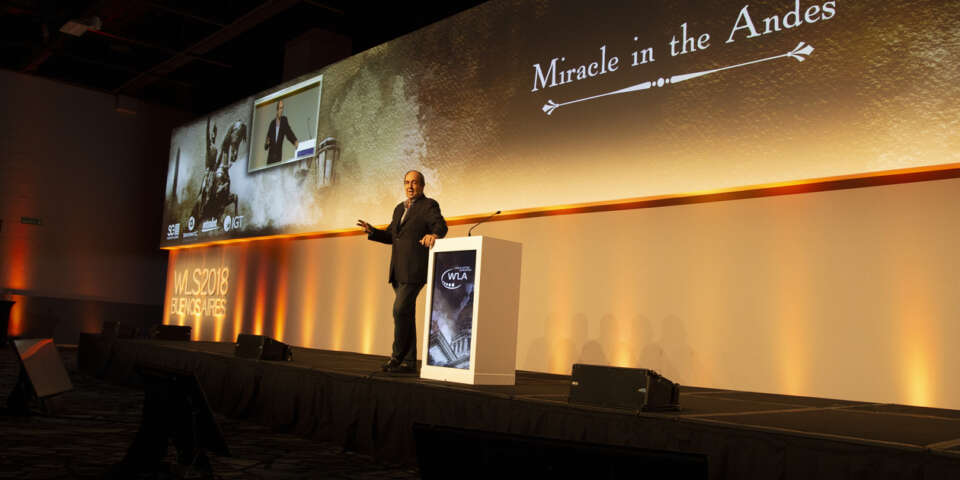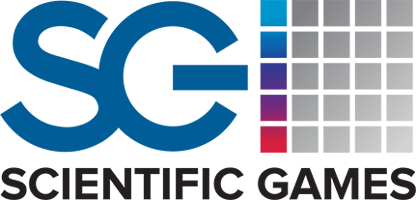Each day, we face challenges, and need to make decisions – but what happens when those decisions could spell the difference between life and death? How do you make the right choice? Nando Parrado, survivor and author, shared his story and insights as the opening keynote speaker at WLS 2018.
Author of Miracle in the Andes: 72 Days on the Mountain and My Long Trek Home, and survivor of the crash of Uruguayan Air Force Flight 571 in the Andes mountains, Nando Parrado, was the first keynote speaker to appear at the World Lottery Summit 2018 in Buenos Aires. He shared the story of the trials and challenges faced by the sixteen survivors under impossibly harsh conditions that nobody believed they could survive. As stated by MC Karin Cohen, this story of leadership and teamwork is an inspiration to all who hear it.
As a member of the Uruguayan rugby team that was stranded in the Andes, Fernando “Nando” Parrado – a 21-year-old student at the time of the crash-landing of Flight 571 – was forced into a position of leadership as he and Roberto Canessa were responsible for finding assistance and bringing aid and rescue to the remaining survivors. His book, Miracle in the Andes, details the horrific events and conditions they endured to survive. Today, Parrado is a proud husband, father and grandfather, as well as a successful businessman and television personality in his native Uruguay.
Parrado opened his presentation, the story of the crash and their survival, by posing the question: How would you have reacted in these circumstances? Would you discover unflattering aspects of your personality? Would you have survived, or died the most horrible death imaginable? And how did a group of young people from a flat country, who had never experienced mountains in their lives, survive?
The survival has, according to Parrado, been romanticized by movies and stories, but, he says, they did not know what they were doing. As university students, they had heard theories about leadership, innovation, strategic thinking, decision-making and more, and yes, these aspects certainly helped with their survival. But, another aspect is, Parrado said, very important, and that is luck.
In a survival situation, Nando believes that, while you may come back without some things that are important to you, be it a friend, a family member, a part of your own body, or your possessions, you will come back without something else, something important. Your life will forever be divided into before and after. Everything is measured in terms of life and death – your own life and death – and this will either bring out the best or the worst of yourself.
In this “Frozen University” – as Parrado lightly referred to the ordeal – he learned more than he ever had at any other educational institution. He shared not only his story, but many insights that can be applied in day-to-day life. While the intensity of the story he told may fade with time, he said that someday, he hoped the delegates would remember what is possible in times of crisis and would find strength and courage in his words.
The story of Flight 571
While on their way to a rugby match in Chile, Nando Parrado’s rugby team, and their family and friends, crash landed in the Andes. The crash was caused by an error in judgement by the pilot, who believed he had cleared the range and started to descend. Instead, they crashed into the mountains during the worst snowfall the area had seen in over 50 years, at over 11,000 feet (ca. 3,400 meters), and in temperatures as low as -30°C (-22° F).
The search for their plane was abandoned after ten days, and the survivors were forced to survive with no help coming. Initially they all slept in the wreckage, until an avalanche buried the fuselage. Following this, three survivors tried to find the tail, which had separated from the plane, nearly dying in the attempt. After this attempt, Nando sought to head out and seek help under some of the worst possible conditions.
The lessons learned
As Parrado himself says, once he had survived this, once he had reached this goal, of finding rescue and saving the remaining survivors, he realized that nothing could stop him from achieving his goals. If he survived this, he could survive anything life could throw at him.
He also gained a new perspective on what is important in life, and how to choose the things that hold real meaning. He says it taught him how to be happy with his life, but he eschews the term “hero”, as he feels it doesn’t apply, as all he wanted was to live.
The power of luck
Upon boarding flight 571, Nando and his best friend opted for row 9, as there were no boarding passes or assigned seats on the chartered flight. This, he says, was either luck or destiny putting him in the right place. When the plane crashed, it broke in half, and everything behind row 9 was lost. Recollecting the last moments before the crash, Nando noted how dangerously close to mountain they were flying. The sights and sound of the impact will remain with him for the rest of his life. Again, he ascribes the specifics of the crash landing as nothing short of absolute luck. As the plane broke, bounced, slid, and crashed again, it miraculously missed numerous areas of rock, any of which would have utterly destroyed the wreckage. Of the 45 people who initially boarded, 29 survived the three impacts of the crash.
Leadership and teamwork
Teamwork and leadership, Nando said, are what this story is really about. During the crash, none of the pilots survived. The 21-year-old captain of the rugby team, Marcelo Perez, immediately took the lead to start helping people, while Parrado languished in a coma for four days. Team captain Marcelo, two hours after the crash, took what Nando describes as the most important decision he has ever seen taken – a decision based on his understanding that the temperature would go below freezing before anyone ever thought to look for them. He decided with utter clarity that they must immediately build shelter, and this was the first step to their survival. When, after several days, no help had come, he was constantly encouraging everyone to keep up their hope and keep working together.
Nando finally awoke from his coma to learn of the death of many of his friends and his mother, as well as the injuries his sister had sustained, which she would succumb to mere hours after Nando’s awakening. His first emotional reaction to the situation was a complete shutdown of external emotions, and all he felt was anger.
Marcelo, was vital to the survival of the others. As his team mates started to get discouraged with no rescue in sight, he strengthened their morale with encouragement and assurance that they would be saved. Having neither food nor water, under harsh sub-zero temperatures, their lives were at constant risk.
After ten days, they managed to catch a radio broadcast, during which they discovered that the search had been abandoned. Nando describes freezing in fear and panic, and how those around him were falling to the ground in shock with the understanding that they were completely alone – trapped in this icy wilderness.
Once they understood they their situation, things changed. Twelve days after the crash, Nando Parrado made the clear decision that he wanted to live and return to his father. This would involve a nearly impossible trek, unless they waited for warmer weather. As surviving for the three months until warmer weather arrived would sustenance, the survivors made a pact to sacrifice and donate their bodies if they died, to feed their friends. In his words, they peeled back the veneer of civilization and agreed to survive this frozen hell.
Further challenges awaited them, including a massive avalanche two weeks into their ordeal. In an incredible display of teamwork, and starting with just two people who escaped being buried under the snow, they managed to uncover 19 of the 27 who were buried within three minutes. Among the eight who perished in the avalanche was team captain Marcelo, leaving them, once again, leaderless.
Upon finding a map with a flight plan, the survivors calculated that they were a scant five to eight kilometers from the nearest village – or so they believed. In reality, it was almost 100km, due to the incorrect path the flight had taken. They believed it would take just a day or two to reach this town, so they started building a sleeping bag from plane parts. In this time, the idea that he would die without seeing his father again, that he would never experience all that life held, threatened to destroy his hope, but he held out for the warmer weather they expected.
One day, when the weather looked promising, Nando Parrado, Roberto Canessa, and Antonio Vizintin set out on a climb that would prove to be considerably longer and more challenging than originally believed. Once night was upon them, they set up camp. In the morning it was decided to send Antonio back to the crash site, as he proved to be the slowest of the three. This decision, said Nando, ensured their survival, as they could now travel further, faster.
They climbed, with no equipment, few clothes, and scant food and water. When they reached the point where they believed the village would be and discovered just more rocks, Nando made another important decision – to keep going. He decided he would not stop until he died, and Canessa chose to join him. After eight and a half days, they found a river and made a decision to go left – again a wise decision, as right would just lead to more water. Instead, they found rescue.
An American climber who retraced their steps has told Nando that he believes the only reason they managed to get it right, was because they had no idea they couldn’t do it. No rescuers could believe that they had traversed the Andes, and were shocked at where the plane had landed. A helicopter flight that took less than an hour found the survivors.
It was on his return home, discovering that his father had been close to broken and been rescued himself by another woman, that Nando Parrado said he needed to make one more decision – that he was going to live. Survivors of trauma often have PTSD, but he says he found life instead. He participated in sports, started four companies, and refused to live a life filled with fear. He faced all those things he had wanted to do his whole life, but avoided because of fear.
However, despite all the challenges he faced and all his achievements, Nando Parrado says that the most important success in his life is his family. Regardless of all the material things he truly enjoys in his life, his most valued achievement, his legacy, is his daughters and grandchildren. His daughters have said that they were born on that mountain, as they wouldn’t be there if he hadn’t fought to survive.
In conclusion, Nando told delegates that the most important thing for him is to be in the present, to live the life that he has, and not to live in the past. He encouraged everyone to enjoy today, as you do not know what tomorrow will hold.








